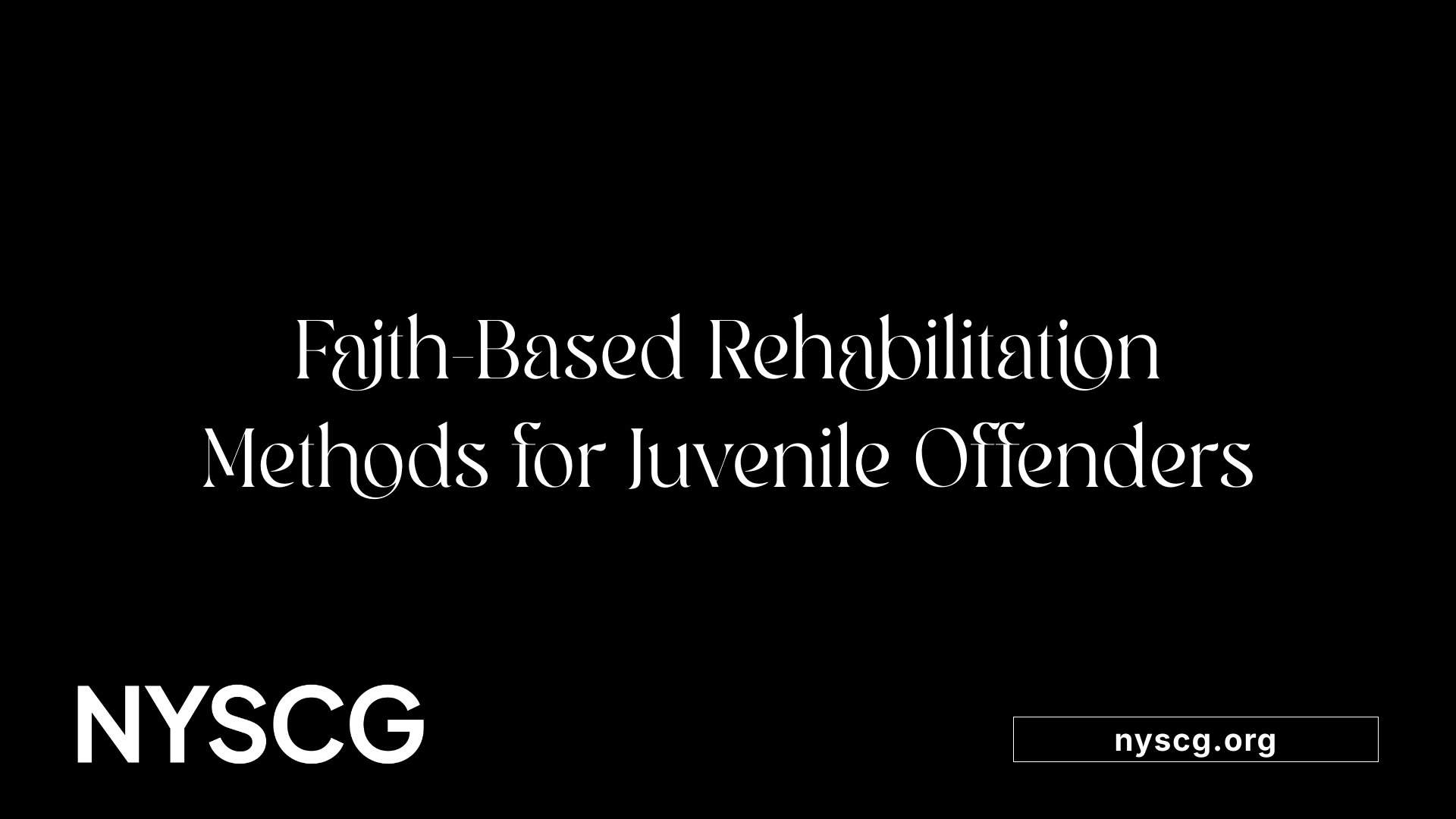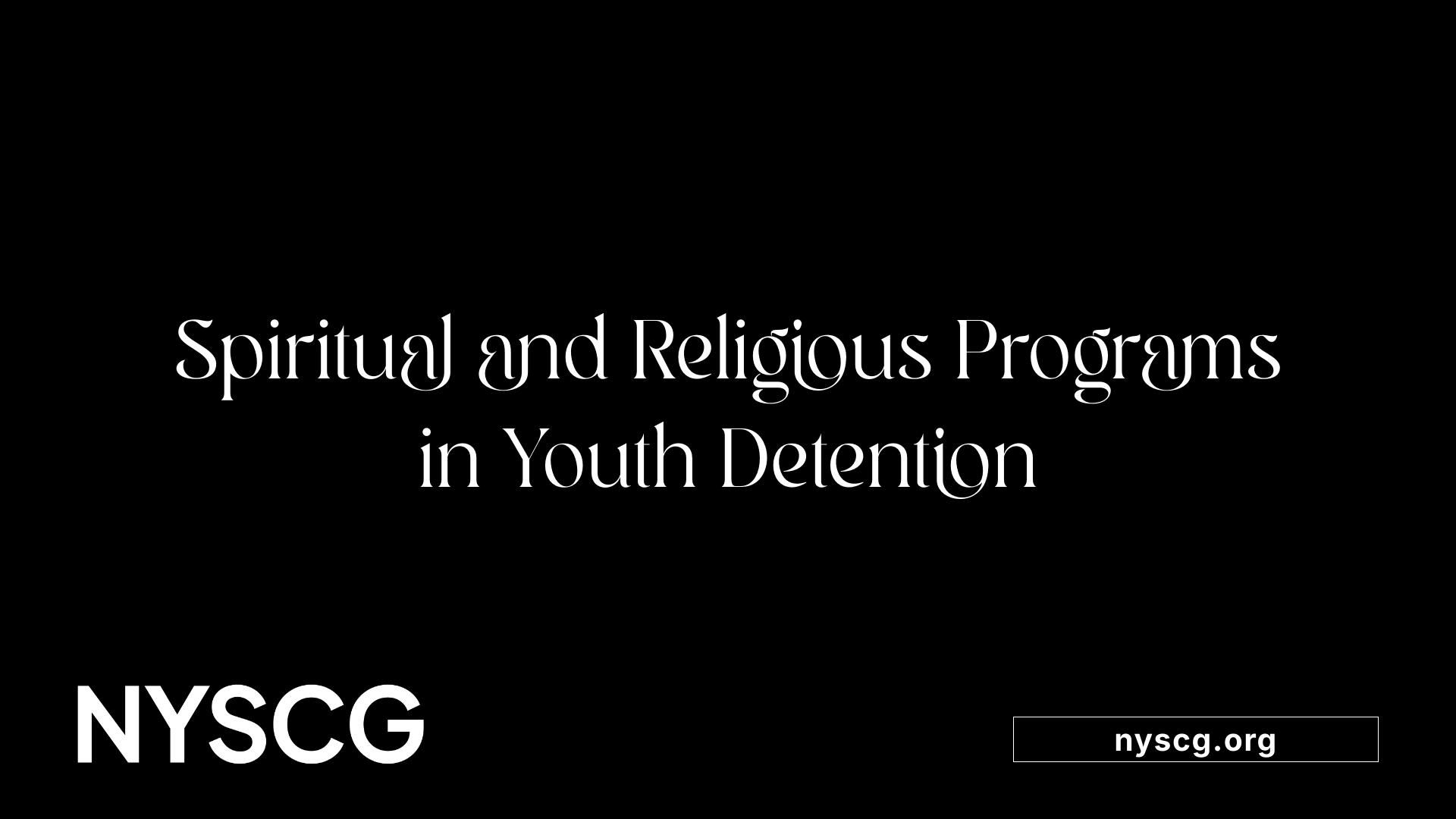Spiritual Intervention for Youth in Juvenile Detention


Spiritual interventions are increasingly recognized as vital tools in the holistic rehabilitation of youth in juvenile detention. By incorporating faith-based practices, tailored programs, and a thorough understanding of adolescents’ spiritual needs, detention centers can foster resilience, reduce recidivism, and promote moral development among juvenile offenders. This article explores the variety of methods, principles, and impacts of spiritual interventions within juvenile justice settings, emphasizing both their potential benefits and the challenges involved.
 Spiritual interventions offer a way to support at-risk youth, especially those involved in juvenile justice systems, by fostering hope, resilience, and healing.
Spiritual interventions offer a way to support at-risk youth, especially those involved in juvenile justice systems, by fostering hope, resilience, and healing.
Common practices include engaging youth in prayer, meditation, and sacred text study. These activities help individuals find inner peace and develop a sense of purpose. Spiritual journaling encourages self-reflection and emotional expression, allowing youth to process their experiences and goals.
In addition, forgiveness exercises are used to promote emotional release and reconciliation, which can be crucial for healing past traumas. Rituals—such as ceremonies or symbolic acts—serve to reinforce positive behaviors and community bonds.
Spiritual concepts like compassion and meaning-making are integrated into interventions to build empathy and help youth discover their purpose beyond their immediate circumstances. These principles can be incorporated into group or individual programs.
A notable approach is spiritually integrated cognitive-behavioral therapy (SPIRIT). This model combines traditional CBT techniques with psychoeducation about spiritual and religious themes. It includes spiritual activities, resource-based strategies, and cultural considerations tailored to the youth’s beliefs.
These interventions are flexible and can be delivered in various settings, including schools, correctional facilities, or community centers. Collaboration with religious leaders, community organizations, and families enhances their effectiveness.
When executed ethically, respecting the diverse spiritual backgrounds of youth, these programs can significantly improve mental health, support behavioral change, and promote overall resilience.
Overall, spiritual interventions for at-risk youth are multifaceted, involving exercises, rituals, and philosophies aimed at nurturing hope, fostering community, and encouraging positive personal development.
 Spiritual and faith-based programs used with juvenile offenders incorporate a variety of practices aimed at holistic rehabilitation. Common practices include prayer, meditation, and studying sacred texts. These activities serve to foster moral development, inner peace, and personal growth among youth.
Spiritual and faith-based programs used with juvenile offenders incorporate a variety of practices aimed at holistic rehabilitation. Common practices include prayer, meditation, and studying sacred texts. These activities serve to foster moral development, inner peace, and personal growth among youth.
Beyond individual spiritual practices, programs often emphasize mentorship, community service, and life skills training. These elements are rooted in biblical and spiritual principles designed to promote ethical behavior and community engagement.
Many initiatives, like the Juvenile Justice Ministry, aim to build ongoing relationships that address the physical, emotional, mental, and spiritual needs of young offenders. Such programs seek to instill hope and purpose, guiding youth toward positive life paths.
Partnerships with government agencies and local organizations are vital for delivering comprehensive services, including counseling, education, and re-entry support. The goal is to reduce recidivism and foster prosocial behaviors among juvenile detainees.
Empirical studies suggest a correlation between active spiritual involvement and lower reoffending rates. This evidence points to the potential benefits of faith-based interventions in promoting positive change and sustained behavior beyond the justice system.
| Approach | Description | Typical Activities |
|---|---|---|
| Prayer and Meditation | Foster inner calm and spiritual connection | Guided prayer sessions, silent meditation |
| Sacred Text Study | Promote moral understanding | Study groups, discussion of religious scriptures |
| Mentoring | Offer moral and spiritual guidance | One-on-one mentorship, group mentorship programs |
| Community Service | Develop empathy and social responsibility | Volunteer work, charity activities |
| Life Skills Training | Equip youths with essential skills | Workshops on decision-making, conflict resolution |
Studies support that integrating these spiritual principles and practices can aid in reducing juvenile delinquency by addressing underlying issues, such as a lack of purpose or moral guidance. Consequently, faith-based programs are increasingly recognized as a valuable component of juvenile justice rehabilitation efforts.

Spirituality offers a vital source of strength and resilience for juvenile offenders. It provides hope and a sense of purpose, helping youth navigate the complex emotions associated with their circumstances. Engaging in spiritual activities—such as prayer, meditation, and religious practices—can foster emotional resilience by enabling them to manage stress, feelings of guilt, and behavioral challenges more effectively.
Research indicates that spiritual involvement can lead to improvements in mental health, particularly by reducing symptoms of depression and anxiety. These practices also promote connectedness to others and support the development of prosocial values, which are crucial for character building and rehabilitation.
In the context of juvenile correctional settings, incorporating spiritual assessments and interventions allows counselors to better understand the worldview and spiritual needs of young offenders. This understanding facilitates personalized support that promotes mental wellness and positive behavioral change.
However, caution is necessary to avoid negative religious coping, such as feelings of divine punishment or abandonment, which can harm mental health. External influences like peer pressure and superficial 'jailhouse conversions' may also undermine genuine spiritual growth.
Therefore, a holistic, culturally competent approach is essential when integrating spiritual practices into juvenile rehabilitation. Such strategies respect individual beliefs while fostering hope, purpose, and emotional strength, ultimately aiding in the long-term mental health and societal reintegration of youth.
Research indicates that spiritual and faith-based programs can significantly support the rehabilitation of juvenile offenders. These interventions include activities such as religious counseling, prayer, meditation, yoga, and spiritual development initiatives.
Studies have shown improvements in mental health among youth participating in spiritual programs. These programs often foster resilience, helping juveniles cope better with personal and emotional challenges. They can also enhance self-awareness and conscience, encouraging prosocial behavior and moral development.
Beyond mental health, spiritual activities contribute to improved emotional intelligence and social skills. For example, participation in group spiritual exercises or community service can promote empathy, cooperation, and leadership.
Evidence also points to reductions in recidivism rates and substance abuse among juveniles involved in faith-based programs. These interventions tend to increase engagement and provide a sense of purpose, which is critical in steering youth away from criminal activities.
Altogether, the existing data supports that spiritual approaches, when tailored to the individual's background and needs, can be a valuable element of juvenile rehabilitation efforts, leading to more positive long-term outcomes.
 Spiritual and religious programs for detained youth are diverse and designed to meet their spiritual needs across different faith backgrounds. These programs often include activities such as prayer groups and worship sessions that provide youth with a sense of community and spiritual nourishment. Religious classes tailored to various traditions are commonly offered to help young people deepen their understanding of their faith.
Spiritual and religious programs for detained youth are diverse and designed to meet their spiritual needs across different faith backgrounds. These programs often include activities such as prayer groups and worship sessions that provide youth with a sense of community and spiritual nourishment. Religious classes tailored to various traditions are commonly offered to help young people deepen their understanding of their faith.
Chaplaincy services play a vital role in many detention centers, offering personalized spiritual guidance, counseling, and support. These services often include Bible studies, which serve as educational tools and opportunities for group discussion and reflection. Evangelism and discipleship programs are also integrated, focusing on spiritual growth and fostering a sense of purpose.
Another important aspect of these programs is meditation, which promotes mindfulness and emotional regulation. Mentorship initiatives connect youths with positive adult role models within faith communities, supporting their moral development and resilience.
Organizations such as Straight Ahead Ministries exemplify faith-based programs that create a continuum of care around spiritual development. Their approach involves engaging youth in faith activities during detention and continuing support after their release, emphasizing lasting transformation.
Overall, these spiritual and religious interventions are aimed at building meaningful relationships, offering guidance, and assisting youth in navigating their emotional and spiritual challenges. By incorporating faith-based activities into detention programs, centers work to foster prosocial behavior, remorse, and rehabilitation, contributing to the overall well-being of juvenile offenders.
For further information, searching "Religious programs and chaplaincy services for juvenile detainees" can provide additional insights into these initiatives.
Incorporating spiritual interventions within juvenile detention programs offers a promising avenue for addressing the complex needs of at-risk youth. By respecting diverse spiritual backgrounds and fostering morally and morally oriented growth, these programs can enhance mental health, reduce recidivism, and support moral development. Effective implementation requires collaboration with community and faith organizations, careful staff training, and ethical considerations in respecting the separation of church and state. As empirical evidence continues to grow, spiritual interventions are poised to become integral components of comprehensive juvenile rehabilitation efforts, helping young offenders find hope, purpose, and a pathway toward positive life choices.
All you need is the will to make the world a better place.
New York State chaplain group inc. is a tax deductible organization with a federal tax Id number 92-383-4921